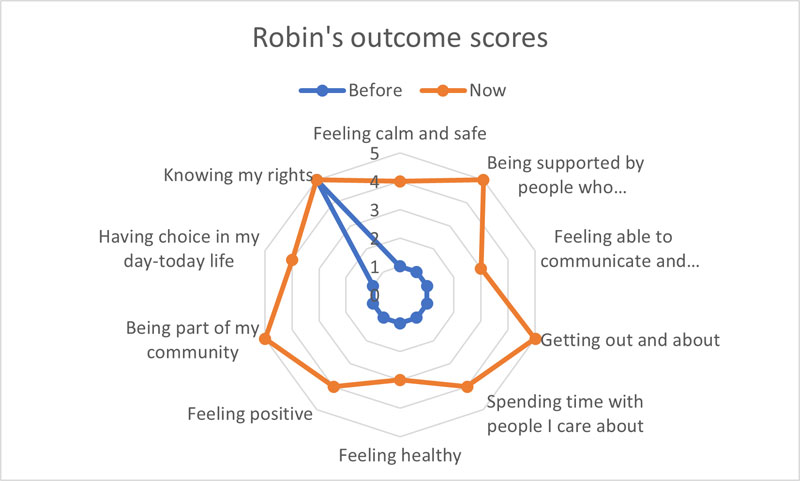This case study forms part of the publication, Bespoke support for people with learning disabilities and autistic people, an evaluation on the impact consequence for local authorities and councils of delivering bespoke support to autistic people and people with a learning disability, including people who have been detained under the Mental Health Act (or at risk of being detained).
I’ve been all over. I lived by myself, but I was evicted from my flat. Social services took me into a care home. I didn’t know how to handle it. Communication broke down with my Mum and social services. A lot of things went wrong. I got blamed for things. I tried to escape and then they said I had mental health issues."
They called the police, but the police don’t have evidence. They don’t understand autistic people and disabled people.
The police kept coming out. A lot of things went wrong. They didn’t let me be independent. They didn’t know anything about birds.
Havencare started to see me and they understood about the birds. [They listened to what was important to me].
People should be encouraged to make decisions for themselves.
There should be a group where disabled people can help to co-design things…to make things better…we need to have a say”.
Robin, Cornwall
Robin had previously had her own flat, but didn’t have the right support, and she was illegally evicted from her flat. She was homeless for a period of time. She carries a lot of grief and pain around that. Robin was aware of the unfairness of her situation but struggled because she didn’t have the words to challenge it.
She moved to a provider placement which was described as supported living; but was set up more like a care home. Robin was labelled as having ‘Challenging behaviour’. There were lots of incidents and the police were called frequently. Robin was very unhappy and distressed. She was grieving the loss of her flat and independence. She often ‘ran away’ and the police were often used as a way of managing her behaviour.
Robin had a single bedroom and 24/7 support after having had her own flat and just one hour of support a day. In the supported living setting, there was a mixture of people with some very diverse needs, whom she struggled to relate to. The care provider placement was in the middle of nowhere; Robin couldn’t access the community. She was isolated.
Staff didn’t understand the distress and trauma she had experienced through losing her flat and the misinformed police responses she had experienced. The staff had a very limited understanding of autism and behavioural responses; and they weren’t equipped or experienced to support Robin in the right way. They were often confrontational and triggering her. The environment wasn’t right (she had a tiny bedroom which was too small). Throughout the circumstances, Robin experienced an ongoing positive relationship with an advocate, who helped her to get the right support in place.
Robin moved across to Havencare, via referral from the local authority who were aware of a vacancy within the Core and Cluster Supported living scheme. It was urgent, due to the risk of homelessness, because of her previous provider closing the service she was living in.
Robin is now living in a self-contained flat and has background support from a ‘hub’ within the building complex. She receives one or two hours of direct support each day. Outside of her direct support hours, she can access staff support from the ‘hub’.
Her life has transformed! Robin has not had any behavioural incidents for six months. She is in a relationship, and experiences positive connections with the staff who support her. Having her own flat with her own garden is very important to Robin.
The background support is what makes it work. Too little support caused breakdown of a previous provider placement, and too much support overwhelmed her and caused distress. She then became labelled as difficult and challenging. There were lots of stories from Robin’s past which followed her ‘on paper’, so there was fear and negativity about whether she would be too challenging to support. Robin now plays a huge part in the local community. She lives close to her Mum, and they are able to spend time together when they want to.
Robin is a great self-advocate and will fight for her rights. She has become a member of the local Conservative party (she wanted to make sure we included that in the case study; she’s very proud about being involved in local politics!). She lives in a two-bedroom flat.
She’s a very creative person and engages in different types of art and creative activity. One room in her flat is used for her art. Robin is part of a local art group- she’s the in-house artist in residence! Robin wrote a poem about lockdown and the effect it had on her.
An important part of her daily routine is feeding the birds. The birds helped her through lockdown and remain an important part of her person-centred support and sense of wellbeing.
As a provider, Havencare has received an overall ‘Good’ in their CQC inspection.
feeling calm and safe 1 before and 4 now.
being supported by people who understand me well 1 before and 5 now.
feeling able to communicate and being listened to 1 before and 3 now.
getting out and about 1 before and 5 now.
spending time with people I care about 1 before and 4 now.
feeling healthy 1 before and 3 now.
feeling positive 1 before and 4 now .
being part of my community 1 before and 5 now.
having choice in my day-to-day life 1 before and 4 now.
knowing my rights 5 before and 5 now.

